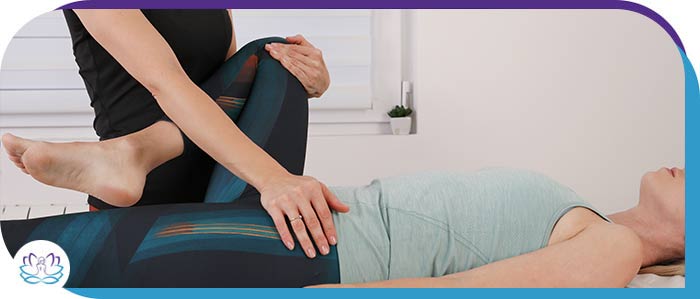Pelvic Floor Treatment Specialist in Chicago IL
Pelvic floor dysfunction is the inability to relax and coordinate your pelvic floor muscles when you need to have a bowel movement. Symptoms include constipation, a struggle to urinate, urine or stool leaks, and a frequent need to pee. Pelvic floor pain is a complex condition that affects many individuals, particularly women. Fortunately, there are various effective relief strategies that can help alleviate pelvic floor pain and improve overall health. If you are experiencing pelvic floor pain, visit us at Dr. Michelle Trandai, MD, OBGYN, to get proper treatment. For more information, contact us or schedule an appointment online. We are conveniently located at 5449 N Broadway, Chicago, IL 60640.


Table of Contents:
What does pelvic floor pain feel like?
Why does my pelvic floor suddenly hurt?
What are the symptoms of tight pelvic floor muscles?
How do you relieve pelvic floor pain?
Anyone suffering from pelvic floor pain will usually note that the pain feels like an ongoing cramp in the pelvic region. It can also range from stabbing or sharp pains that shoot up the vagina or rectum. Many will often have pain during sex or when using tampons during their menstrual cycle as well, which can last for hours afterwards.
When dealing with pelvic floor pain, it is crucial to seek professional help and support. Consulting healthcare professionals, such as gynecologists, urologists, or pelvic floor specialists, can ensure proper diagnosis and treatment. These professionals have the expertise to identify the underlying causes of pelvic floor pain and recommend appropriate interventions. In many cases, a multidisciplinary approach may be necessary, involving collaboration between different healthcare providers to address the various aspects of pelvic floor pain. Additionally, pelvic floor physical therapists specialize in treating pelvic floor disorders and can provide valuable guidance and support throughout the healing process. They can educate individuals on proper exercises, techniques, and lifestyle modifications to manage and alleviate pelvic floor pain. Furthermore, support groups and online resources can offer a sense of community and provide a platform for individuals with pelvic floor pain to share their experiences, seek advice, and find emotional support.
Pelvic floor pain can arise from various factors, including muscle imbalances and dysfunction, weak pelvic floor muscles, and hypertonic pelvic floor muscles. Muscle imbalances and dysfunction occur when the muscles in the pelvic floor are not working together harmoniously, leading to pain and discomfort. This can be caused by factors such as poor posture, repetitive strain, or trauma. Weak pelvic floor muscles, on the other hand, can result from childbirth, aging, hormonal changes, or a sedentary lifestyle. These weakened muscles are unable to adequately support the pelvic organs, leading to pain and discomfort. Conversely, hypertonic pelvic floor muscles refer to muscles that are overly tense or contracted. This can occur due to stress, anxiety, or chronic pelvic pain conditions. The tension in these muscles can cause pain and difficulty with normal bodily functions.
Fortunately, there are several solutions available for managing and alleviating pelvic floor pain. Physical therapy and targeted exercises are often recommended to address muscle imbalances and dysfunction. A skilled physical therapist can assess the individual’s specific needs and develop a personalized treatment plan. This may include exercises to strengthen weak muscles, stretches to release tension, and techniques to improve overall muscle coordination. Pelvic floor muscle training, commonly known as Kegel exercises, is another effective solution for pelvic floor pain. These exercises involve contracting and relaxing the pelvic floor muscles to improve their strength and flexibility. Regular practice can lead to significant improvements in pain and overall pelvic floor function. Additionally, stretching and relaxation exercises, such as yoga or deep breathing techniques, can help release tension in hypertonic pelvic floor muscles and promote relaxation.
Pelvic floor pain is a debilitating condition that can significantly impact a person’s quality of life. However, with the right strategies and techniques, individuals can find effective relief and improve their overall well-being. Understanding the causes and symptoms of pelvic floor pain is crucial in order to develop a personalized treatment plan. Physical therapy, including exercises and techniques such as biofeedback, can help relax and retrain the pelvic floor muscles. Additionally, incorporating lifestyle modifications and self-care techniques such as stress management and psychological support can further enhance the management of pelvic floor pain. By taking a holistic approach to treatment, individuals can find relief from pelvic floor pain and regain control over their lives.
A few of the symptoms to be aware of if you think you may have tight pelvic floor muscles include:
– Pain that gets worse with certain movements is relieved by repositioning the body.
– Pain during sex
– Difficulty urinating
– Frequent or painful urination
– Urinary incontinence
– Difficulty defecating
– Bloating and constipation
– Lower back pain
Understanding pelvic floor pain is crucial in order to effectively manage and treat this condition. Pelvic floor pain is characterized by chronic pain in the muscles of the pelvic floor, which can be caused by a variety of factors. Some common causes of pelvic floor pain include trauma, childbirth, surgery, infections, and muscle imbalances. The pelvic floor muscles play a crucial role in supporting the pelvic organs and maintaining urinary and bowel continence. When these muscles become weakened or tight, it can lead to pain and dysfunction. Individuals experiencing pelvic floor pain may also experience symptoms such as pain during intercourse, urinary urgency or frequency, and bowel dysfunction. Conditions such as pelvic floor dysfunction, vulvodynia, and interstitial cystitis are often associated with pelvic floor pain.
There are several effective relief strategies for pelvic floor pain that can help alleviate symptoms and improve overall function. Physical therapy and exercises are often recommended as a first-line treatment for pelvic floor pain. These exercises aim to relax and strengthen the pelvic floor muscles, improving their flexibility and function. Techniques such as diaphragmatic breathing and stretching exercises can help release tension in the pelvic floor muscles and promote relaxation. Additionally, biofeedback and electrical stimulation are commonly used to retrain the muscles and improve coordination. Biofeedback involves using sensors to provide real-time feedback on muscle activity, helping individuals gain better control over their pelvic floor muscles.
In addition to physical therapy and exercises, lifestyle modifications and self-care techniques are essential in managing pelvic floor pain. Stress management and psychological support play a crucial role in reducing pain and improving overall well-being. Cognitive-behavioral therapy can help individuals develop coping strategies and change negative thought patterns associated with pain. Relaxation techniques such as meditation, yoga, and deep breathing exercises can also help reduce muscle tension and promote relaxation. Support groups and counseling can provide emotional support and a sense of community for individuals dealing with pelvic floor pain.
If you have urinary dysfunction, painful intercourse, or pelvic pain, get the right treatment and diagnosis. Dr Michelle Trandai, MD, and her team of specialists will care for you. For more information, contact us or schedule an appointment online. We are conveniently located at 5449 N Broadway, Chicago, IL 60640. We serve patients from Chicago IL, Evanston IL, Ravenswood IL, Uptown IL, Lake View IL, Lincoln Park IL, Buena Park IL, Bowmanville IL, Boystown IL and Roscoe Village, IL.






